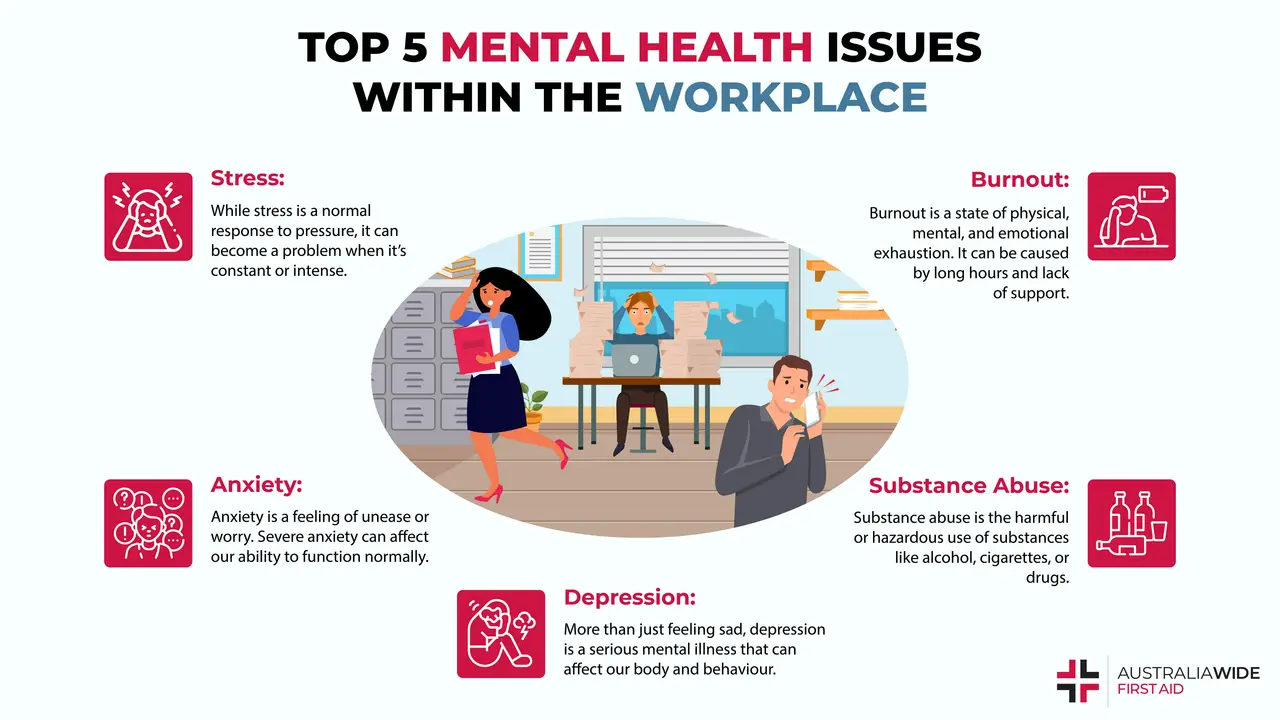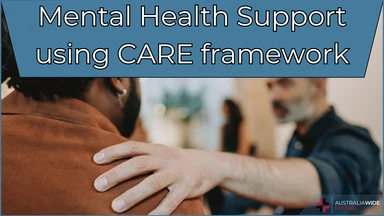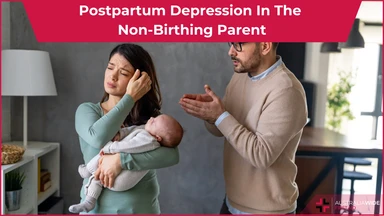The Top 5 Mental Health Issues in the Workplace


Mental health is a term used to describe a person's psychological well-being.
It can affect how we think, feel and behave. Mental health problems are common, with one in five Australians experiencing a mental illness each year. Mental health problems can range from mild to severe and can affect anyone, at any stage of life.
The workplace is one environment where mental health issues can arise. In fact, research shows that mental health problems are the second leading cause of disability in Australia, costing the economy around $11 billion each year.
There are many factors that can contribute to mental health problems in the workplace, including:
If not managed effectively, mental health problems can lead to absenteeism, presenteeism (when employees are physically present but not productive) and staff turnover. They can also result in reduced productivity, increased errors and accidents, and lower morale.
Mental health issues can have a significant impact on businesses, costing them billions of dollars each year. Here are the five most common mental health
There are a number of mental health issues that can occur in the workplace. These include:
1. Stress: Stress is a normal response to pressure or demands. It can become a problem when it's constant, intense and interferes with our ability to cope. Workplace stress can be caused by a number of factors, including job insecurity, long hours, unrealistic deadlines, heavy workloads and lack of support.
2. Anxiety: Anxiety is a feeling of unease, worry or fear. It can be mild or severe and can affect our ability to function normally. Workplace anxiety can be caused by a number of factors, including job insecurity, long hours, unrealistic deadlines and lack of support.
3. Depression: Depression is more than just feeling down or sad. It's a serious mental illness that affects our mood, thoughts, body and behaviour. Workplace depression can be caused by a number of factors, including job insecurity, long hours, unrealistic deadlines, lack of support and isolation.
4. Burnout: Burnout is a state of physical, mental and emotional exhaustion. It can be caused by work-related stress, such as long hours, heavy workloads, unrealistic deadlines and lack of support.
5. Substance abuse: Substance abuse is the harmful or hazardous use of substances, such as alcohol, drugs or cigarettes. It can lead to physical and mental health problems, and can affect our ability to function normally. Workplace substance abuse can be caused by a number of factors, including job insecurity, long hours, unrealistic deadlines and lack of support.
If you're experiencing any of these mental health issues, it's important to seek help from a qualified professional. Early intervention can help prevent the problem from getting worse.
If you're experiencing mental health problems at work, it's important to seek help early. There are a number of ways to get help, including:
There are also a number of things you can do to build mental resilience at work, including:
If you're concerned about your mental health, or that of someone you know, it's important to seek help early.
Education is a powerful tool in fostering a society that truly values mental health. Without it, misconceptions and stigma can cloud our understanding, discouraging people from seeking the support they need.
Mental health plays an equally vital role as physical health in overall wellbeing. Early recognition of mental ill-health signs and symptoms can ensure that timely help is provided, potentially averting crises.
By completing a Mental Health Support Course , you gain the skills and confidence to identify when someone is struggling and provide meaningful support when it matters most.

February 18, 2025
Mental health can be influenced by every aspect of our lives, and the weather is no exception. In places closer to the equator with humid environments, like Darwin here in Australia, the onset of monsoon season can see people suffer from a tropical seasonal affective disorder known as ‘mango madness’.

January 16, 2025
Mental health crises can occur unexpectedly, and knowing how to respond effectively can make a significant difference. The CARE framework is an easy-to-remember guide for offering support during a mental health crisis. It is also applicable if you think you might be seeing signs and symptoms of low mental health in a loved one, friend, or colleague.

June 3, 2024
New parents, both birthing and non-birthing, can develop postpartum depression. Birthing parents are easily recognized as being at risk for postpartum depression; however, it is important to acknowledge that non-birthing parents are equally susceptible to experiencing postpartum depression.